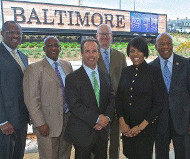6/3/2015
Baltimore, Maryland Looks To Revive Traffic CamerasCity council report seeks to clear the way for more red light cameras and speed cameras in Baltimore, Maryland.

The city council in Baltimore, Maryland wants to move beyond the embarrassing episode that saw parked cars receiving speeding tickets in the mail. A handful of the speed cameras operated by Xerox proved to be so inaccurate that one out of three tickets went to drivers who were traveling within legal limits. The council on Monday issued a report meant to account for the city's mistakes.
The problems came to light in 2012 when a series of Baltimore Sun articles exposed widespread accuracy problems. As the scandal developed, Baltimore eventually stopped the once-lucrative program. The latest investigation concluded that this happened primarily because neither the city nor its vendor had the staffing needed to handle the massive volume of tickets.
After reviewing 38,101 documents, the city council committee also faulted city administrators for insisting that Xerox hand over its speed cameras and red light camera equipment when the city decided in 2012 to switch to a different, less experienced photo ticketing contractor. This vendor, Brekford, could not get the Xerox equipment to work on its own, and Xerox was not interested in helping its competitor by supplying the necessary (and proprietary) software.
"This oversight not only led to the city paying millions of dollars for useless hardware, but also made it virtually impossible for Brekford to complete the transition in the time frame demanded of them," the report explained.
Brekford formally took control of the cameras on January 1, 2013, but it could not blame all of its problems on Xerox. Brekford's oversight was so lax that the firm issued tickets that had no time stamps on them. The report speculated that this was made worse by city managers who applied heavy pressure on Brekford to start producing citations.
"It [the city] had developed an increasingly serious dependence upon the income generated from the camera violation citations," the report found. "Very shortly after Brekford assumed responsibility for the system, the 'word' came down that the city was 'losing a million dollars a month' because the cameras were not fully up and running."
The report revealed that Brekford was paying Richard Retting, author of nearly every one of the insurance industry's studies claiming red light cameras are effective. Baltimore officials insisted that the city fund Retting directly to create the false appearance that he was providing an expert opinion on the photo enforcement program. This was an illusion, according to the vendor.
"Great news, we were able to get the city of Baltimore to hire you separately so it looks independent," Brekford CEO C.B. Brechin wrote to Retting. "Again, thanks for all your service."
The report noted that the Retting payoff was the only instance of potential corruption uncovered in the council investigation.
"While there may have been no impropriety involved on the part of Mr. Brechin or Mr. Retting, the choice of words in the email leads one to question the propriety of the hire," the report noted. "The investigators forwarded the email and related documentation to city solicitor Nilson for further investigation. No response was received."
The city was not overly concerned about impropriety or the innocent motorists receiving false tickets. Officials had discussed an incentive program that would have paid Brekford a bonus even if it issued up to 250 bogus tickets every month.
"The real challenge will be getting the media to accept that, while the city is doing everything we can to improve the accuracy rate, the system will not be perfect and some (very small) percentage level of error may still occur," program manager Jamie McDonald wrote in a March 14, 2013 email.
The Maryland Drivers Alliance does not believe the council's report resolves the fundamental failings of Maryland's automated ticketing machines.
"My biggest concern is that Maryland's problems were not isolated to Baltimore and that other local governments have failed to learn the right lessons," Ron Ely, the group's chairman, told TheNewspaper. "Some counties and cities are more interested in making sure word of errors does not reach the press, and in constructing layers of legal mumbo jumbo to keep bad practices in place, than in ensuring the system is genuinely fair."
A copy of the report is available in a 3.4mb PDF file at the source link below.


